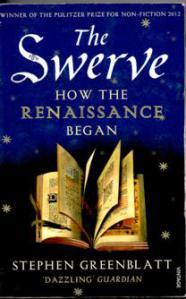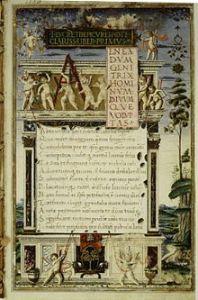
How the Renaissance Began
As I think I have mentioned before, I have had The Swerve: How the Renaissance Began (Stephen Greenblatt) on my bed side table for a few months. I bought it just after Christmas with a book token from my daughter but it has lain neglected until our summer trip. If I tell you that I was reading this at 1am while sitting at Holyhead Port awaiting an overnight ferry (it’s a long story), then perhaps that might indicate just how well Stephen Greenblatt teases out the strands of his story into an enthralling read.
Greenblatt sets out to tell the story of the re-discovery in 1417 of a copy of an ancient poem origin by the Roman poet Titus Lucretius Carus (c 99 BCE – c 55 BCE), a follower of Epicurus (341 BCE – 270 BCE). By the 1400s, all of Lucretius’ writings seemed to have been lost, except for quotations in the work of Ovid and Cicero.
Luctretius’ work De Rerum Natura (On the Nature of Things) was re-discovered by a Papal Scribe with humanist leanings called Poggio Bracciolini (1380 – 1459). As Greenblatt makes clear, Bracciolini was more interested in the poetic quality of the work than the Epicurean inspired philosophical ideas contained within the text. The content of Lucretius’ work would have been somewhat in conflict with his role as the Pope’s amanuensis.

De Rerum Natura
Greenblatt goes on to trace the effects of De Rerum Natura over the centuries that followed. Provocative ideas had been quietly mouldering away, contained within a manuscript in a monastery scriptorium, copied by some long ago hand. But what were the ideas, the ones that were destined to inspire writers and thinkers for generations? The one that really surprised me was Lucretius’ theory that everything was made of atoms. I had no idea that a theory along those lines existed so many centuries ago. One of the most shocking ideas that Lucretius put forward must have been the assertion that the world and all that it held wasn’t made by any divine being. Everything that happened in the universe had a natural explanation and wasn’t the result of gods throwing their weight about. And furthermore, that there is no life after death, no heavenly rewards.
The spread of Lucretius’ ideas down the years from reader to reader and from country to country makes for fascinating reading. Also fascinating to read about was the desperate reaction of the Catholic hierarchy as they sought to contain all traces of new (or rather old) ideas and philosophy from the Pagan past. Greenblatt traces Lucretius influence running through the works of Machiavelli, Montaigne, Ben Jonson and Shakespeare. Apparently Thomas Jefferson owned several copies of De Naturum Rerum and Moliere wrote a verse translation.
I’ve only skimmed the surface here to give you an idea, but even if you don’t have a bent for history this is a fascinating read, touching as it does on so many aspects of life and philosophy. Well worth a read!
Let me know if you have any thoughts…

